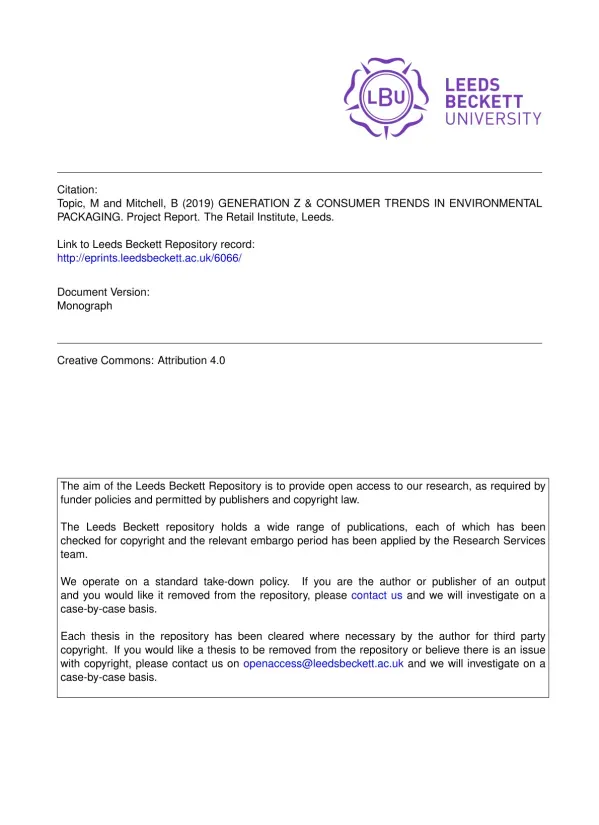
Exploring Generation Z's Impact on Environmental Packaging Trends
Document information
| Author | Ben Mitchell |
| School | Leeds Beckett University |
| Year of publication | 2019 |
| Place | Leeds |
| Document type | Project Report |
| Language | English |
| Number of pages | 41 |
| Format | |
| Size | 2.06 MB |
- Generation Z
- Environmental Packaging
- Consumer Trends
Summary
I. Introduction to Environmental Packaging Trends
The report titled Exploring Generation Z's Impact on Environmental Packaging Trends delves into the evolving landscape of environmental packaging. It emphasizes the critical role of consumer behavior in shaping packaging strategies. The document highlights that manufacturers and retailers must engage consumers to understand the implications of packaging changes aimed at reducing carbon footprints and waste. The report underscores the importance of generational research, particularly focusing on Generation Z, to identify emerging trends in consumer attitudes and behaviors. A review of recent academic literature provides insights into how generational perspectives can inform effective packaging strategies. The findings suggest that understanding the motivations and behaviors of Generation Z is essential for developing sustainable packaging solutions that resonate with this demographic. The report also discusses the significance of consumer insights in enhancing the effectiveness of environmental packaging initiatives.
1.1 The Role of Consumer Behavior
Consumer actions are pivotal in determining the success of packaging interventions. The report notes that effective strategies must consider consumer perceptions and behaviors towards environmental packaging. Research indicates that consumers' understanding of packaging changes can significantly influence their purchasing decisions. The document references studies that analyze the impact of packaging on food waste and environmental sustainability. For instance, a study highlighted in the report examines how packaging design can affect consumer behavior regarding food expiration dates. The findings reveal that extending expiration dates and optimizing package sizes can reduce food loss and waste. This underscores the necessity for manufacturers to align packaging designs with consumer behavior to achieve sustainability goals.
II. Generation Z s Environmental Consciousness
The report provides a comprehensive profile of Generation Z and their unique relationship with environmental issues. This generation is characterized by a heightened awareness of sustainability and a strong preference for eco-friendly products. The document emphasizes that Generation Z consumers are more likely to engage in pro-environmental behaviors, such as recycling and supporting brands that prioritize sustainability. The report cites research indicating that Generation Z is willing to pay a premium for products with sustainable packaging. This willingness reflects a broader trend where younger consumers are increasingly prioritizing environmental considerations in their purchasing decisions. The findings suggest that brands targeting Generation Z must adopt transparent and sustainable packaging practices to capture their loyalty and trust.
2.1 The Influence of Social Media
Social media plays a crucial role in shaping Generation Z's perceptions of environmental issues. The report highlights how platforms like Instagram and TikTok serve as powerful tools for raising awareness about sustainability. Influencers and brands that promote eco-friendly practices can significantly impact consumer behavior. The document notes that Generation Z is more likely to engage with brands that actively communicate their sustainability efforts through social media channels. This trend underscores the importance of effective communication strategies in promoting sustainable packaging. Brands must leverage social media to educate consumers about the environmental benefits of their packaging choices, thereby fostering a deeper connection with Generation Z.
III. Practical Applications of Research Findings
The insights derived from the report have significant implications for businesses and policymakers. Understanding Generation Z's preferences can guide companies in developing packaging solutions that align with consumer values. The report advocates for the adoption of sustainable materials and innovative designs that minimize environmental impact. Additionally, it emphasizes the need for brands to engage in transparent communication regarding their packaging practices. By doing so, companies can build trust and loyalty among Generation Z consumers. The findings also suggest that policymakers should consider the preferences of younger generations when formulating regulations related to packaging and sustainability. Collaborative efforts between businesses and policymakers can lead to more effective strategies for promoting sustainable packaging practices.
3.1 Future Research Directions
The report identifies several areas for future research, particularly in understanding the evolving preferences of Generation Z. Further studies could explore the long-term impacts of sustainable packaging on consumer behavior and brand loyalty. Additionally, research could investigate the effectiveness of various communication strategies in promoting sustainable packaging. The document encourages interdisciplinary approaches that combine insights from marketing, environmental science, and consumer psychology. Such research endeavors can provide valuable guidance for businesses seeking to navigate the complexities of consumer preferences in the context of environmental sustainability.
Document reference
- GENERATION Z & CONSUMER TRENDS IN ENVIRONMENTAL PACKAGING (Ben Mitchell & Dr Martina Topic)
- Environmental analysis of packaging-derived changes in food production and consumer behaviour (Yokokawa et al.)
- Purchase intentions for bioplastics (German consumers study)
- Sustainable design strategies on purchase intentions (Various researchers)
- Visual ecology of product packaging (Various researchers)
